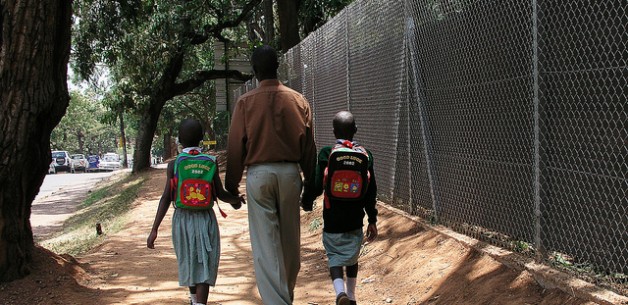A father walks his children to school in Uganda / Photo credit World Bank
On March 15, 2016 the third and final phase of the World Bank Safeguards Review came to a close. Governments and members of civil society from around the world submitted statements and recommendations on the current safeguards draft, and over thirty in-country consultations were held from Brussels to Beijing to Tegucigalpa.
The safeguards draft, which provides social and environmental protection for communities and ecosystems affected by World Bank-financed projects, will now be reviewed by the Bank’s Board of Executive Directors. The process could be completed and a new draft approved as early as summer 2016.
The many controversies surrounding the safeguards draft are far from resolved. Many national governments still have grave concerns with the proposed draft, especially its lack of detail on how the new safeguards would be budgeted and implemented. Civil society organizations echo these concerns as well as many others regarding the strength of the draft as compared to current Bank safeguards policy. Upon the Bank’s release of the second draft of the new safeguards framework, BIC and 18 other organizations noted that the new draft “contradicts World Bank President Jim Yong Kim’s promise to ensure that the Bank’s new rules will not weaken or ‘dilute’ existing mandatory environmental and social protection measures and calls into question the extent to which the Bank has responded to public input.” Participants in the most recent round of consultations on the draft (held from October 2015-March 2016) expressed worry that the draft would both fail to protect project-affected peoples and ecosystems, and shift responsibility for this protection to borrowing governments, despite the fact that many lack the resources, capacity, strong legal frameworks and the political will to fully comply with Bank safeguards.
For instance, in the case of the recently cancelled Uganda Transport Sector Development Project, the current safeguards failed to protect local women and children from sexual assault by laborers brought into communities for construction on a road project. According to a case study presented at the Washington, DC safeguards consultation by BIC Child Rights Program Manager Elana Berger, the new draft would repeat many of the same failures, especially by omitting any detail on how to asses project impacts on vulnerable groups such as women, children, and persons with disabilities. The draft furthermore does not include adequate provisions ensuring that communities are consulted, and provided with accessible, transparent and timely information on the project. Moreover, the draft fails to recognize core international agreements such as the International Labor Organization Core Labor Standards, or the UN Declaration on the Rights of the Child.
BIC and its civil society partners will continue to advocate for these essential provisions. BIC also welcomes the support of the U.S. government in advocating for stronger requirements on disclosure, budget, and implementation. For more information, see our safeguards page, and check our twitter @BIC_updates.

